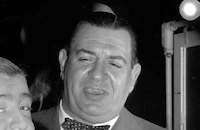Reducing

Brief Synopsis
Cast & Crew
Charles F. Riesner
Marie Dressler
Polly Moran
Anita Page
Lucien Littlefield
Buster Collier Jr.
Film Details
Technical Specs

Synopsis
The snobbish Madame Pauline "Polly" Rochay operates an exclusive beauty parlor in New York City that specializes in weight reduction. When she learns that her sister, Marie Truffle, is destitute, Polly decides to take her, her husband Elmer and their three children, Vivian, Jerry and Marty, from South Bend, Indiana, into her home. Joyce, Polly's socialite daughter, objects to her mother's decision, insisting that the Truffles are too unrefined to live among the Rochays. When the Truffles finally arrive in the big city, Polly puts her sister to work at her salon while Elmer looks for work as a mail carrier. Joyce resents the intrusion of the ill-mannered Truffles, and Polly concurs with her when the meddlesome Marie damages the beauty parlor and her children scratch her car. One evening, while Joyce is out on a date with her playboy sweetheart, Johnnie Beasley, Marie and Polly compare their daughters' boyfriends. Polly boasts that Johnnie is the better because he is a sophisticated millionaire, while Marie informs Polly that Tommy Haverly, Vivian's boyfriend, is from one of the oldest families in South Bend. Polly then insults Marie when she tells her that Vivian will never meet the same caliber of men that Joyce meets. When Johnnie brings Joyce home, he meets Vivian and takes an immediate liking to her, which makes Joyce jealous. The next day, after spurning Tommy, Vivian goes on a lunch date with Johnnie. Joyce later accuses Vivian of trying to steal her boyfriend. At the salon, Marie makes a nuisance of herself when, after a series of errors, she accidentally locks Polly in the steam room. Later, Polly and Marie become embroiled in their daughters' quarrel over Johnnie, and Marie strikes Joyce when Joyce insults Vivian. Three months pass, and the Truffles, now settled into their own home, await the arrival of Johnnie, who has been dating Vivian and will be escorting her to a party. While Vivian and Johnnie are out on their date, the heartbroken Joyce visits Marie and begs her to intervene in her daughter's affair with the man she loves. Moved by her show of emotion, Marie agrees to help Joyce by going to Johnnie's and speaking to him on her behalf. At Johnnie's, Marie accuses the young playboy of unfairly turning Vivian's head with fancy cars, yachts and other luxuries and then giving her the gate. Marie then insists that Johnnie marry Joyce, which he agrees to do. Marie tells her daughter that Johnnie was not worthy of her love because he was only seeing her to make Joyce jealous. After Joyce and Johnnie's wedding, Polly, unaware that Marie was responsible for their reunion, calls to gloat about the news and remind Marie that Vivian should have "stayed in her own class." However, when Joyce explains Marie's involvement, Polly thanks her sister for her help, and the two forgive each other.

Director

Charles F. Riesner
Cast

Marie Dressler

Polly Moran

Anita Page

Lucien Littlefield
Buster Collier Jr.

Sally Eilers
William Bakewell
Billy Naylor
Jay Ward
Crew

Videos
Movie Clip



Hosted Intro
Film Details
Technical Specs

Articles
Reducing
"Life for Dressler had begun to change even after the release of Anna Christie in 1930," wrote biographer Betty Lee in The Unlikeliest Star. "But by the time Min and Bill was dominating the national box office, followed in January 1931 by the release of the less-successful Dressler-Moran comedy, Reducing, MGM was delivering fan mail to the Bedford Drive house in sacks. Social invitations from such Hollywood luminaries as Mary Pickford and Douglas Fairbanks, Marion Davies and William Randolph Hearst, and Norma Shearer and her powerful husband, Irving Thalberg, began to roll in. Dressler dutifully turned up at some of the parties, but as Claire Dubrey made clear in her memoir, the actress was essentially a homebody who preferred to arrange her own small dinner parties at Bedford Drive, always followed by a game of bridge or backgammon."
Although Reducing was a boxoffice success for MGM, it was not a hit with the critics. Variety complained that "the film is only saved by the genius of Marie Dressler." The studio didn't care, however, and hustled Dressler and her comedy sidekick Polly Moran into another farce, this one about two women who take on some small-town racketeers and corrupt politicians. It was called Politics (1931).
Director: Charles F. Riesner
Screenplay: Beatrice Banyard, Robert E. Hopkins, Willard Mack, Zelda Sears
Cinematography: Leonard Smith
Art Direction: Cedric Gibbons
Film Editing: William LeVanway
Cast: Marie Dressler (Marie Truffle), Polly Moran (Polly Rochay), Anita Page (Vivian Truffle), Lucien Littlefield (Elmer Truffle), Buster Collier Jr. (Johnnie Beasley), Sally Eilers (Joyce Rochay), William Bakewell (Tommy Haverly).
BW-76m.

Reducing
Quotes
Trivia
Notes
This film was the first of three pictures made in 1931 and 1932 that co-starred Marie Dressler and Polly Moran as a comedy team.















